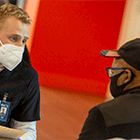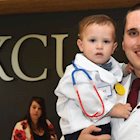Kansas City University (KCU), with a 103-year history of successfully impacting the health of the region, today announced it is pursuing a College of Dental Medicine on its Joplin, Mo., campus. The new college will address the significant and growing oral health needs of the four-state region of southwest Missouri, northwest Arkansas, northeast Oklahoma and southeast Kansas.
In 2017, KCU established an additional medical school campus in Joplin to address the health needs of this rural area. Establishing a College of Dental Medicine aligns with KCU’s mission and builds upon its osteopathic foundation, which is rooted in a holistic philosophy of patient care.
“KCU has been successful in not only establishing a College of Osteopathic Medicine in Joplin, but continues to develop other programs that contribute to the overall health of the communities we serve,” said Marc B. Hahn, DO, president and CEO of KCU. “Our track record, combined with significant population health data and strong support from our Joplin community gives us the confidence to move forward with this transformative project.”
This four-state region’s critical oral health needs are compounded by a dearth of dentists. Nationally, access to a dentist is a challenge in almost all rural areas. Nearly all counties within a 125-mile radius of Joplin qualify as Dental Health Professional Shortage Areas (DHPSAs) by the U.S. Health Resources and Services Administration (HRSA). In Missouri alone, 376 additional dentists are needed to remove the DHPSA designation. While Oklahoma requires 166, both Arkansas and Kansas need more than 100 to address these shortages. With only three dental schools in the four-state area, there is a challenge in training an adequate number of dentists to help meet these needs.
Over the past 12 months, KCU has completed a feasibility study to assess regional needs, projected the economic impact of the program, identified funding sources and begun designs for the facility. Additionally, KCU hired James Koelbl, DDS, MS, in January to serve as vice provost for Oral Health Initiatives and spearhead the program. Koelbl has begun pursuing accreditation and identifying strategic partnerships.
“We believe an innovative, community-based dental education program will help bridge the gap between medical and dental care and expand access to care for children and adults in the region,” said Dr. Koelbl. “Our community-based plan for offering oral health services will ensure our students have the experience in providing comprehensive care to a large and diverse group of patients in the region.”
The project’s anticipated cost of more than $80 million is twice that of KCU’s 2017 medical school expansion in Joplin. The University has committed $40 million towards funding this project with the remainder from philanthropic efforts. The College of Dental Medicine will further enhance KCU’s role as an economic driver in the multi-state region and specifically the City of Joplin. It is estimated the College of Dental Medicine will generate a financial impact of $45 million annually, support more than 200 jobs and generate at least $1.7 million in state and local taxes.
“Beyond the economic impact, there’s a significant investment in the lessons learned and the skills that will be offered in our community,” said Rudy Farber, chairman, Community Bank and Trust. “The tangible and intangible impacts are many and showcase the need for community support to help KCU achieve its goals.”
With almost $20 million secured, KCU is halfway to its philanthropic goal. Generous donors include Harry Cornell, Sunderland Foundation of Kansas City, Rudy Farber, the Farber Foundation and Larry McIntire, DO.
University leaders shared project renderings, with plans to break ground in 2020. From there, the goal is to seat a class of 80 students in 2022.
“In our four-state region, the need — and the opportunity — to tackle the oral health crisis has never been greater,” said Dr. Hahn. “At KCU, we embrace both by identifying creative solutions, building partnerships and training professionals to face today’s health issues head on. With the support of generous donors and the broader community, we are in a unique and favorable position to help close this troubling gap and improve oral health outcomes for at-risk populations.”




(0) Comments